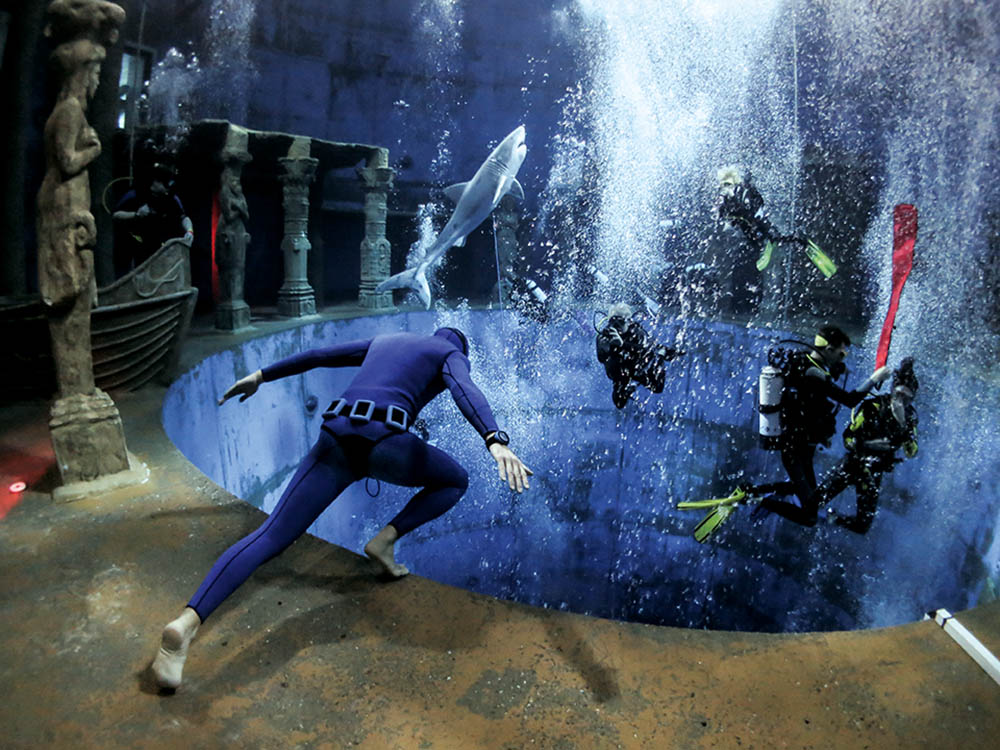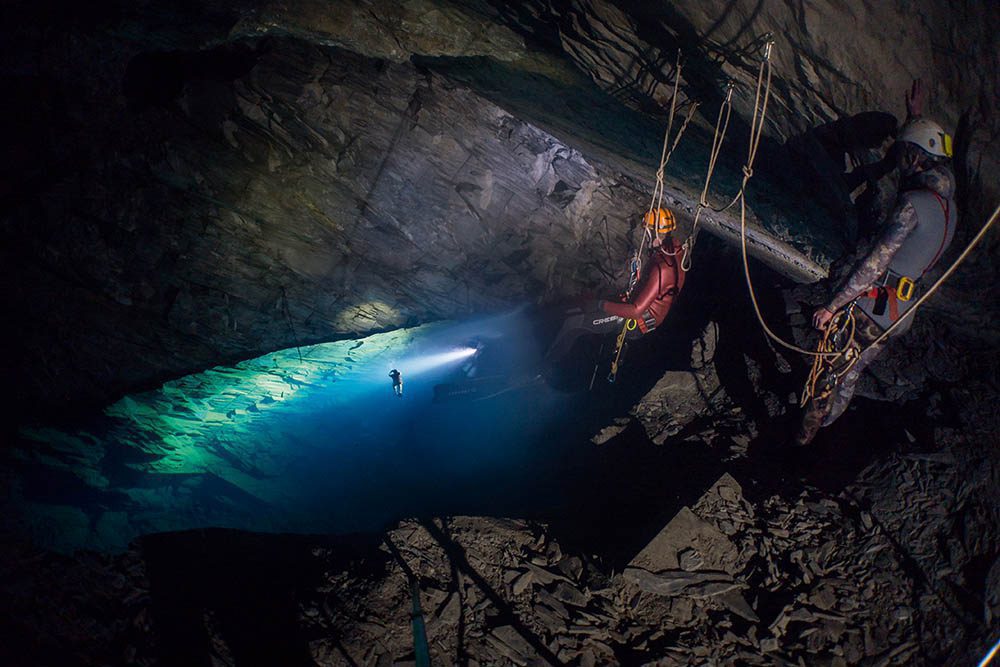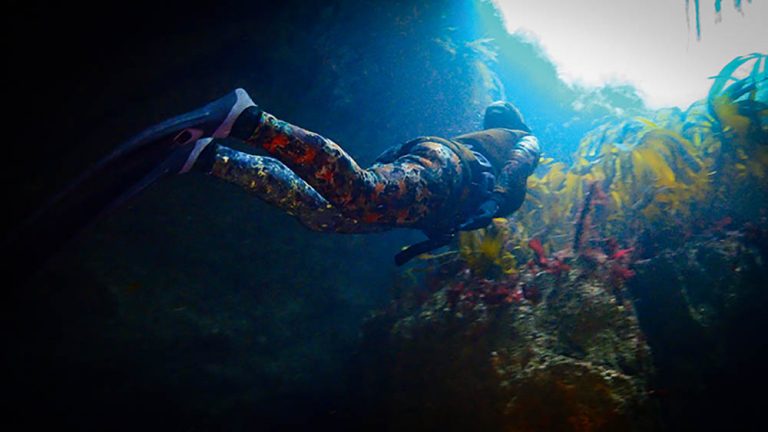FREE DIVER
Freediver Louise Williams exits from Harry’s Hole 10m swim-through, which sits at between 4 and 10m depending on tides at Secret Beach next to Hell’s Mouth in Cornwall.
FREEDIVING – shiny-suited athletes sliding into the depths, pushing themselves into hypoxia in an effort to dive deeper and longer.
That’s the image the word conjures up, and recently the GoPro revolution has brought us another perception, of people in glorious seas on an adventure – interacting with whales, dolphins and even sharks.
Anybody who has been snorkelling while on holiday, looked at the fish while wild-swimming or pushed off under water in the local pool has, in essence, experienced the joy of freediving.
The desire to indulge in that freedom for longer is what drives us to hone our apnea skills. And you don’t have to go far to practise this beautiful sport in safely.`
Pool Training
At this point it’s imperative to underline the rule that you should never freedive alone, in case you were about to pop down to your local pool by yourself to see how far you could swim under water.
There are many clubs and schools around the country that can show you the basic techniques needed to train safely, and this pool-training is easily accessible.

There are more than 1000 weekly pool sessions in the UK. Such training can be very effective if done systematically.
The 10 individual aspects of freedive training can be learnt dry, but training in a pool, mostly one no deeper than your local public baths, makes it easier.
These basic aspects can be grouped into three areas: Relaxation, Breathing and Technique, and becoming proficient in all these areas is fundamental.
Firstly, relaxation of the mind will drastically reduce oxygen consumption, which offsets the copious amounts of O2 through which the muscles in our body burn when tense.
Secondly, breathing efficiently maximises oxygen levels before a dive, going on to purge waste products (such as CO2) from the body after a dive and accelerating recovery.
Finally, internalised techniques will provide maximum effectiveness, well-practised skills allowing movement through minimal effort.
All of these are essential parts of the training, but training is useless if it’s not done, and done regularly.
For that reason, fun is an essential ingredient to any session plan – it helps to bring everyone back the following week!
The importance of fun and games can’t be over-estimated. Not only is it about entertainment but it helps subconsciously in developing awareness and macro-motor skills. When the body is having fun it’s truly relaxed, accepting information more willingly and more completely.
Deep Pools
There are a few deep pools in Europe, and they’re a train ride away. From 10m to 40m deep, these are great places to practise your vertical skills – that is, twisting your horizontal skills by 90° – while adding surface (duck) dives and freefall to your repertoire.
Nemo 33 in Brussels and Y40 near Venice focus on competition-style rope-diving, while Dive4Life near Cologne in Germany boasts the possibility of a nine-hour day of snorkelling or diving in caves as well as on ropes. Personally, the bonus of the onsite hotel and sauna wins my vote for a weekend away well-spent.
UK Open Water
While pool sessions are fun, there is always a yearning for adventure and nature that can’t be satisfied by chlorinated water. In the UK we are blessed with a plethora of inland and coastal sites that offer a huge variety of depths, topography and challenges.
The most accessible of these are commercial diving lakes, most of which allow freediving (nowadays!) by qualified buddy-pairs.
The huge diversity of set-ups all have their various advantages, be it convenient location, underwater attractions, hot showers or even the best bacon butties.
Always check out the prices as well as onsite facilities such as parking before you arrive, because they do vary wildly: forewarned is forearmed.
When diving in these lakes, be aware of marking ropes on the attractions, because many are not tight, which makes them tangle hazards. To tackle this issue we use a rope-tensioner, not only for safety but for the enjoyment of pulling down, too.
Fish are a possibility, and for the relaxed, well-trained apneist, fauna will not be scared off by you. This can result in encounters envied greatly by our bubble-blowing brothers and sisters.
Although the temptation can be huge, extreme caution must be employed when swimming through attractions. Although most sites go to great lengths to “clean” their attractions before sinking them, there is always a possibility of snags, and the worst-case scenario ends up with you getting stuck. In fact, many inland dive-sites warn against being in any overhead environments when freediving.
The wildlife in the UK is diverse, with every site offering the possibility of unique encounters. To date we have dived with snakes, huge carp, massive pike and diving birds as well as legions of crawfish (both American and native UK varieties). So do some research before diving in.
UK Coastlines
From the imposing North Sea coast, through the Farne Islands to meet the famous friendly seals, right down to the Channel Islands with their masses of sealife, the expanse of unexplored UK seascapes is huge.
Caution must be exercised, because tides, currents and life-threatening waves are possible throughout the British Isles. The best advice for a first-time trip to the coast would be to dive with an experienced diver with local knowledge.
This is where spearfishermen come in – they have been diving our waters for years. Simply find one, and ask him to put down his death-stick and guide you to the interesting sites with his insider knowledge.
We have had great success booking onto kayak trips. These have taken us to hidden gems just out of swimming range, and so unexplored for the most part.
Koru Kayaking in Cornwall offers one example. Weather permitting, Tom Wildblood is not only happy to show off the caves, coves and tunnels of the county but also to invite the discerning freediver to get in and explore sub-surface.
Wildlife in the UK is insane. It’s difficult to convey the mind-boggling diversity of creatures that are happy to dive with us in these cool waters. My UK tally so far includes not only basking sharks, seals, starfish and huge varieties of fish, large and small, but elusive creatures such as dolphins and smaller species of shark, such as blues and smooth-hounds.
UK Extreme Locations
Thrill-seekers shouldn’t feel left out, because there is a long list of extreme freedive locations in the UK – so much so that my club NoTanx now runs courses specifically for accessing and diving these amazing places.
North Wales offers a particularly large array of extreme locations for enthusiastic freedivers. Again, local knowledge is paramount. Caving societies have a wealth of information, and are almost always eager to help people get into their subterranean sport.

One location that comes to mind is fondly called “The Test”. Phreatic divers can climb a “mountain” (technically it isn’t a mountain, but it feels like one), enter a disused mine-shaft and ascend an access shaft before abseiling down into a huge lake.
The water is so undisturbed and clear that the bottom, some 25m below, looks set for you simply to descend and stand on it as if in air.
Although this is not for the faint-hearted, it does allow an opportunity for the curious to learn the skills required for this captivating sub-sport.
The coastlines also offer a host of amazing locations for the more intrepid. My own favourites on the South Coast involve abseiling, mines and sea-caves.
Pendragon’s Grail, for instance – favoured locations earn new names to reflect their unique qualities – requires vertical single-rope skills as well as nerves of steel to descend to the cave’s entrance.
Once in the water the pay-off is a huge tunnel, usually accompanied by friendly greetings from the local seals. The tunnel runs beneath the headland to join up with another sea-cave, offering the chance of a dive of up to 10m in length through the cave with seals as company.
Diving in the UK, we’re always careful not to enter caves used for pupping, as parent seals can be very protective.
Of course, all these sites are highly weather-dependent, so taking a look at several weather bulletins to check wind direction and the size of swell on different sides of the coast is very important.
Cheap European Holiday Destinations
Moving further afield, these days we’re spoilt for choice when it comes to cheap flights to warmer climates. The Croatian coast down to Greece is a particular favourite for freediving, thanks to the crystal-clear water and deep coastal topography.
Diving can be integrated into a family holiday or be a trip in its own right. Mainland competition training centres or island getaways are easy options for the UK traveller.
Just one example: Loutraki offers the convenience of an Athens flight as well as a town in which to base a trip. Hotels, supermarkets and evening entertainment makes this a popular choice for groups – but let’s cut to the chase; the diving locations and experiences are awesome.
Being a peninsula, one side is usually sheltered, and several dive-spots are almost always flat enough to dive. Heraion Bay in particular is more than 130m deep just 20m from the idyllic beach, and diving there while surrounded by an impressive archaeological site is awe-inspiring.
This is freediving heaven, but the north coast is littered with dive-sites such as Paradise, Utopia and the Beach, all offering memorable walls, wildlife and wonder, and all named by us.
There are hundreds – if not thousands – of similar places waiting to be discovered, many no more than an £80 flight away from you.
In Conclusion
Pool training may seem tame and sterile, but the skills learnt will augment your open-water experiences, so that freediving becomes either part of a family holiday or an objective in itself.
Opportunities for underwater adventure are often right under our noses – you don’t have to go far to be free.
Sure, locations further from home offer fantastic diving, and dedicated trips to the Red Sea or Maldives allow experiences and encounters in dream locations. Just don’t overlook what lies close to home.
To find out more about entry-level freediving, check with your training agency about courses run in your area, or contact a dedicated freediving club such as NoTanx.

